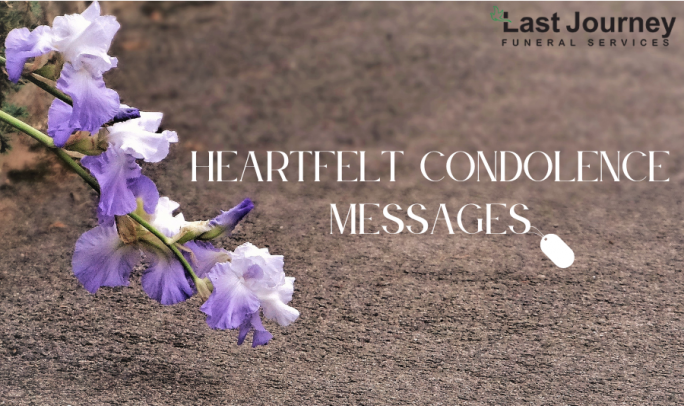Lastjourney Blog
Top 10 Condolences Messages for Every Situation

 Table of Contents
Table of Contents- Condolence message for a friend
- Condolence message for a colleague
- Condolence message to a person who is experiencing loss of parent
- Condolence message to a person who is experiencing the loss of a partner or spouse
- What are the tips for writing condolence messages?
- What Not to Say in a Condolence Message
If you think that a heartfelt condolence message will not make any impact in a person's life who has recently experienced loss, but it absolutely will. The researches show that a well-written condolence message provides a pause to reflect, grow, and acknowledge to the mourner that there is space to experience both the positive and the negative aspects of the life journey.
Offering a card, sympathy gift, or a phone call might not pacify the aching heart, but a set of certain words will sooth the mourner. The sensitivity expressed through the words acts immediately, and the mourner will realise that he or she is not alone in this tough situation but is accompanied by near and dear ones.
Here, in this article, you will get detailed information about the right condolence messages that you can write for a specific person or a relationship. Whether you are looking for a short or long condolence message for the demise of a beloved friend, friend's family member, relative or colleague, this page will help you in the best possible way.
Condolence message for a friend
To lessen the pain of your friend who has just lost their beloved family member, you can pick one of these condolence messages.
1. Words of sympathy feel inadequate in expressing grief and sorrow for a loss so great. Sending a warm embrace and all my love during this sad time.”
2. "Losing someone so close is so hard. I will be here to support you at any time and at any hour. Sending you so much love.”
3. "Thinking of you. Please know that if you need a change of scenery, a place to rest, or a hot meal, my door is always open."
4. "I know that grief comes in waves. That’s why I intend to be with you throughout this difficult journey.”
Also Read, Exploring the Spiritual Aspects: Hindu Funeral rituals and Mantras
Condolence message for a colleague
At a workplace, usually people or co-workers know very less about each other's family and daily life. Hence writing a condolence message for a colleague's loved one's loss might be tough. From the below given messages, you can take hint.
1. "Please know we are thinking of you during this painful time. As your work family, we are here for you.”
2. "In these moments, when there are no words, know that the ones we love remain beside us, now and always.”
3. "We are saddened to learn of your loss. Please know that we’re thinking of you and are here for anything you may need.”
4. “If there wasn’t so much love, it wouldn’t be this hard to say goodbye. Our thoughts are with you.”
Condolence message to a person who is experiencing loss of parent
1. "Losing a parent is never easy. My thoughts are with you during this challenging time."
2. "I have been thinking of you and your family during this difficult time. Please accept my deepest sympathies."
3. "Please accept my sympathies on the passing of your mother/father. Wishing you peace and comfort as you remember them."
4. "My heart goes out to you in this time of sorrow. Please accept my condolences on the loss of your parent."
Also Read, How to Safely Transport Ashes by Air: Tips and Guidelines
Condolence message to a person who is experiencing the loss of a partner or spouse
1. "Please accept my heartfelt condolences on the passing of your partner. Wishing you strength."
2. "I’m deeply sorry for your loss. My thoughts are with you during this difficult time."
3. "I’m so sorry for the loss of your spouse. My heart goes out to you during this tough time."
4. "Please know that I am thinking of you and your family as you mourn the loss of your spouse."
What are the tips for writing condolence messages?
When a person experiences a beloved one life loss, a well-crafted condolence message can give much-needed comfort and support.
However, in such a vulnerable phase, wisely choosing words that will be light in their darkness is necessary. You should make sure your remarks are well-received. For that, you'll need to follow these guidelines while writing a condolence message.
- Be Genuine and Sincere: The message written by you should show, you are feeling sad for their loss and you are saying these words from the heart. The person will appreciate sympathy card messages that feel personal and sincere.
- Avoid Cliches: You should avoid using comments like “they are in a better place” or “things will get easier.” While these remarks are well intended, but these remarks will show your insincerity towards the pain.
- Respect Privacy: Be mindful of how personal your sympathy card message gets. Express sympathy and offer support without prying into their personal affairs. Convey your condolences respectfully without overstepping the boundaries.
- Offer Support, Not Advice: Every person has its own way to handle the grief in a different manner. Unless they ask you for advice, avoid telling the mourner how he/she should feel or how they can overcome this pain.
- Be Aware of Cultural Differences: When expressing condolences to a coworker, it’s essential to be careful of cultural differences. Various cultures have different customs and religious practices regarding the grief and mourning. You should avoid comparing the cultural differences as well.
- Focus on the mourner and his/her mental state: While it is ok to mention the person who died, the focus of your sympathy message should be on your colleague or friend. Hence, offer sympathy to them.
- Use the Right Medium: Consider the best way to deliver your message. Depending on your relationship, a handwritten note, email, or a message on a group sympathy eCard can be appropriate.
- Forcing emotions and compassion should be avoided: While writing a condolence message, you should avoid including points such as, "how did you feel when you lost a person with whom you shared a similar relationship?"
Along with including sensitive words in a condolence message, one can offer genuine help to the mourner. It will make the mourner realize he/she is accompanied by near and dear ones.
What Not to Say in a Condolence Message
When someone is going through a loss, we want to say something that brings them comfort. But sometimes, even with the best intentions, certain words can hurt instead of help. Grief is a very personal experience, and during such an emotional time, what you say really matters.
So, here are a few common phrases you should avoid in a condolence message, and some gentle, more thoughtful ways to say what you mean.
❌ “They’re in a better place.”
Why to Avoid: While this may be intended as a spiritual comfort, it can feel dismissive of the mourner’s current pain, especially if they are not religious or are struggling with their faith.
Try Instead:
✔ “I hope you find comfort in the love that surrounds you right now.”
❌ “Everything happens for a reason.”
Why to Avoid: This phrase may come across as minimizing the loss. It implies that the person’s grief is part of a bigger picture — which may not be comforting in the moment.
Try Instead:
✔ “There are no words to make this easier, but I am here for you in any way you need.”
❌ “At least they lived a long life.”
Why to Avoid: Even if the person was elderly, this statement can minimize the mourner’s current sorrow. The depth of grief doesn’t always correlate with the age of the person lost.
Try Instead:
✔ “No matter how long we have with someone, it’s never enough. I’m truly sorry for your loss.”
❌ “I know how you feel.”
Why to Avoid: Grief is unique to every individual and relationship. Saying this can unintentionally shift the focus to your own experience, rather than theirs.
Try Instead:
✔ “I can’t imagine what you’re going through, but I want you to know that I care and am here for you.”
❌ “Stay strong” or “Be brave.”
Why to Avoid: These comments can pressure the mourner to suppress their emotions instead of allowing themselves to fully grieve.
Try Instead:
✔ “It’s okay to feel whatever you’re feeling right now. Take all the time you need to grieve.”
❌ Bringing Up Your Own Loss in Detail
Why to Avoid: While trying to relate, it’s important not to overshadow the mourner’s pain with your own story.
Try Instead:
✔ “When I went through something similar, what helped me was having friends around. Please know I’m here for you.”
❌ Don’t give advice they didn’t ask for (like “You should…” or “Try to move on…”)
Why not: Grief is different for everyone. Giving advice can make someone feel like their feelings aren’t okay.
Say this instead:
✔ “I’m here for you. If you ever want to talk or need anything, just let me know.”
Your email address will not be published. Required fields are marked *












